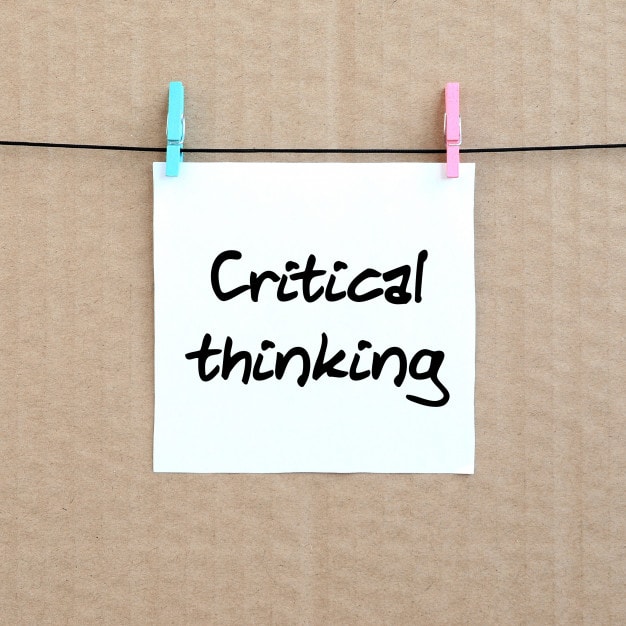The ability to think better by improving thinking skills with the help of rational observations, logical interpretations, and objective analysis is understood as critical thinking.
People with critical thinking abilities are capable of making independent decisions by evaluating a situation or circumstance via logical thought processes to come up with better and more constructive solutions.
So, if you want to make right and rational decisions about what to do and what not to do, then you should empower your critical thinking skills. In this post, we will talk everything about the critical thinking abilities and how you can incorporate those. So, let us get started right away-
Table of Contents
What is Critical Thinking?
In our personal as well as professional lives, we encounter many painful points like dilemmas, confusions, and roadblocks.
These can be dealt with by having proper knowledge of the matter and doing a lot of thinking. There are various types and stages of thought. One of the significant forms of thinking is critical thinking.
This skill can be effectively used to organize data, store it, and handle it well.
Problem-solving is also an application of this skill. You can apply this skill in your personal life to look at matters in a very objective manner and find a solution that is fair and unbiased.
The industries or the sectors use this skill to solve their problems better and mitigate the factors of risk and susceptibility towards fraud and financial losses.
Definition of Critical Thinking
Critical thinking is an ancient concept. It has been a topic of interest right since Plato and Socrates. Critical thinking had its roots directly in the 20th century.
In the latter half of this century, people began thinking in rational and interdisciplinary ways. The renaissance and the revolutions that took place pioneered the senses of critical thinking.
Michael Scriven and Richard Paul presented an in-depth definition of critical thinking at the 8th Annual International Conference on Critical Thinking and Education Reform, which was held in the summer of 1987.
Critical thinking is an intellectually disciplined process.
In critical thinking, there is rationality and a sense of thinking objectively. A person who can think critically can look beyond the emotional value of a thing or an idea and draw a logical connection between them.
He can prove things on paper, and this helps to get more tangible results.
The two most important abilities required to be possessed by a critical thinker are questioning and reasoning. He/she should be able to ask the ideas or the concepts and give the exact reasons for the arguments and conclusions drawn by him/her.
Activities in Critical Thinking
There are various activities involved in critical thinking which enhance its success rate. Some of them are:
- Identify the issue or the problem and identify where you need to apply critical thinking.
- Collect proper information and data that is required to solve the problem
- Sort the data correctly and organize the findings
- Detect mistakes and remove inconsistencies from the data available
- Gather relevant ideas and arguments
- Solve the problem rationally and systematically.
- Analyze the solution for flaws and shortcomings
- Improve the solutions using this data
- Present the final solution highlighting its pros
Critical Thinking Skills
There are some skills which one needs to enhance critical thinking. These skills can be mastered using workshops and classes. Some of these skills are:
1. Identification
The basis of critical thinking is the correct identification of the problem. The actual situation of the problem is an influential factor in solving the question correctly.
Once you know the problem well, you can think properly and find out better solutions. The solutions satisfy every aspect of the problem and give a wholesome answer.
2. Observation
The skills of observation are critical in critical thinking. One needs to observe the surroundings to understand the problems. Problems can be identified through the correct representation of the things happening in the surroundings.
Also, one can find the solutions by mere observations. That is why consideration is the key to critical thinking.
3. Research
When a critical thinker gathers all the necessary information, he/she should do proper research of the data. The authenticity of the data should be verified.
The person should do verification of the resources and make sure that the sources are not fake. Also, the data should be complete so that one can avoid reaching conclusions based on half or incomplete information.
4. Analytical skill
It is an essential skill for any critical thinker. If one can analyze the data correctly and adequately, he/she can be good at critical thinking. An analysis is the ability to scrutinize something or examine something in detail.
It can be a problem, a person, or a dataset. If you understand the data correctly, you can explain it well to your team members. This skill helps in solving problems faster and more effectively.
5. Eliminating biases and inducing objectivity
One of the most crucial points of critical thinking is objectivity. Even the smartest and most intelligent people commit the mistake of getting carried away with emotions and drifting away from reality.
However, if one gets objectivity in the thought process, it reduces the risks involved. It is essential to eliminate any biases you have towards an idea or a person. It can hamper your analytical skill and pose a threat to critical thinking.
6. Communication skill
Communicating your thoughts is very important, yet not everyone can master it. Communication is truly an art. The ability to share your ideas with your colleagues, hearing their opinions out, and then coming to a fair conclusion is called communication skill. To work in a team and maintain harmony, you need to be good at communication.
It enhances your productivity. You can find out better solutions and get the best of critical thinkers to work by having proper discussions and letting the stakeholders know of the same. All of this comes under communication skills.
7. Curiosity
It has been established that the essence of critical thinking lies in questioning and reasoning. If you do not ask ample questions, you will not get innovation. You will not be able to find out the best and most optimal solutions.
Likewise, if you do not reason well, you will not be able to test your answers, and this might get the correctness and preciseness of your solution in trouble. To avoid all of these problems, you need curiosity.
The team members and critical thinkers should know that there is nothing wrong with asking questions and trying to find answers to each one of them.
8. Creativity
Creativity is the ability to explore the real things to get something new out of them. It is the sense used to think out of the box and come up with the most ground-breaking ideas.
The old ideas might be tried and tested, but that does not negate the possibility of the newer ones being more effective. Hence, you should be open-minded to adopt creative ideas and be embracive of them. Creativity sows the seeds of innovation and invention. Critical thinking can be best used creatively.
9. Problem-solving
This skill is the pillar of critical thinking. We generally bring critical thinking in the picture when we encounter a problem or face a roadblock. Here, problem-solving skills come to help.
The ability to analyze the problem and finding the best possible solution is called problem-solving skills. There are solutions of various kinds. A critical thinker needs to evaluate each one of them and then zero down on the most optimal solution.
Ways to Improve Critical Thinking
Critical thinking can be improved by undergoing various training programs and workshops. However, such things can only support your abilities. You need to cultivate your core strengths from within by developing the right attitude and aptitude.
Here are some of the ways of improving critical thinking.
1. Expand your industry-specific knowledge
If you know what is going on around you, you can identify the problems better. Also, if you have enough knowledge of the field in which you are working, you can find more relevant solutions.
These skills will give you a wholesome understanding of critical thinking.
2. Volunteer to solve problems
Knowledge without applications is like not know at all. That is why if you want to excel as a critical thinker, you should volunteer to solve the problems your team encounters.
That will help your employer and your seniors trust your problem-solving skills and assign such tasks in the future.
3. Seek advice from your seniors and professionals
When you start the process of enhancing your critical thinking capacity, you should look up to examples of people who have mastered this art. You can seek advice from such people and try to bring finesse to your work. That will help you establish yourself as a critical thinker.
4. Play intriguing solo and team games
You can sharpen your critical thinking skills by playing such games that aim at building your abilities. There are various games designed by psychologists and the most revered researchers in this field to enhance critical thinking.
Final Thoughts!
The fourth industrial revolution is on its way. There is almost no industry that will remain untouched by this revolution. There will be the emergence of interdisciplinary working.
These changes need to be predicted for appropriate actions to be taken, and here, critical thinking has excellent scope.
Critical thinking is an asset that has great value in various industries. If you want to improve your ability of critical thinking, you can improve the skill set given above.
How important do you consider critical thinking abilities to grow in contemporary times?
Liked this post? Check out the complete series on Skills

